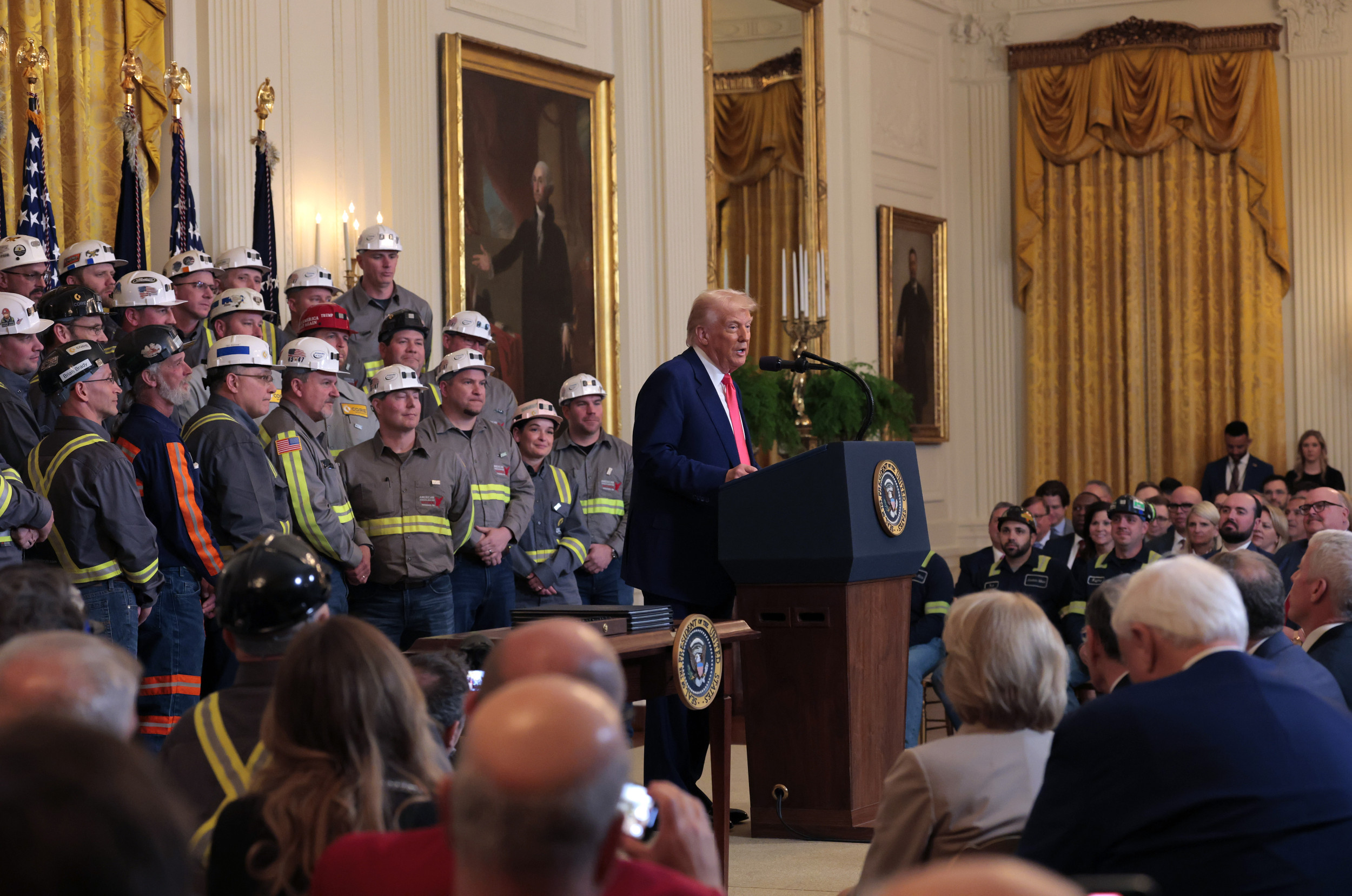President Donald Trump's sweeping global tariffs will negatively affect his adopted home state of Florida, experts have warned.
Abigail Hall Blanco, assistant professor of economics at the University of Tampa, told Newsweek that Trump's tariff plans are like a "Category 5 economic hurricane created by policy" that will damage businesses in the Sunshine State.
Newsweek has contacted the White House and Florida Governor Ron DeSantis for comment via email.
Why It Matters
Since Trump entered politics, Florida has become one of the redder states in the country. Any major backlash from Republican voters in Florida over his tariff plans could have nationwide political implications.

What to Know
Trump announced his "Liberation Day" tariff plans on Wednesday, saying they will boost the U.S. economy, address trade imbalances and help domestic manufacturing.
The new wave of tariffs includes a 10 percent baseline on all foreign imports from dozens of countries, with higher "reciprocal" tariffs targeting nations such as China and Vietnam.
Global financial markets reacted negatively to the president's plans. On Thursday, the S&P 500 dropped 4.8 percent, marking its steepest decline since 2020. The Dow Jones Industrial Average fell around 4 percent, wiping trillions of dollars off market value.
Blanco warned that Trump's tariffs will similarly stunt Florida's economic growth. Florida is the eighth-largest destination for imports in the U.S. In 2022, it received more than $112 billion in merchandise goods from countries heavily impacted by Trump's tariff plans, including China, Japan and members of the European Union.
Like the rest of the country, Florida car dealerships and consumers are also at risk from the 25 percent tariff on imported automobiles.
Analysts have frequently warned that Trump's worldwide tariffs would force companies to pass increased costs onto consumers.
Blanco said there will be three "big groups of losers" in Florida: consumers, companies that rely on imports—such as restaurants and construction firms—and exporters who will face retaliatory tariffs introduced by other countries.
William Luther, associate professor of economics at Florida Atlantic University, said that the immediate net financial loss to those in Florida, and all Americans, appears to be "very, very large."
Luther added Florida should expect a short-term "sharp contraction" in real estate and tourism, both vital sectors for the state's economy.
However, the long-term effects are harder to predict, Luther told Newsweek, and whether Floridians are "ultimately helped or harmed" by the tariffs depends on how long they remain in place.
In response to Trump's tariffs, several countries—including China—have implemented retaliatory measures and increased tariffs on U.S. goods.
During his first term, Trump imposed a 25 percent tariff on steel and a 10 percent tariff on aluminum imported from most countries. These tariffs were eventually rescinded in part due to global backlash and retaliatory measures.
Trump reignited calls for 25 percent tariffs on steel and aluminum imports during his second term, and they took effect ahead of Wednesday's "Liberation Day."
What People Are Saying
Abigail Hall Blanco, assistant professor of economics at the University of Tampa, told Newsweek: "These tariffs will hurt Floridians and the economic growth of the state—full stop. I see three big groups of losers. The first are the producers of goods and services who rely on imports. Your neighborhood restaurants that rely on ingredients for authentic cuisine from Colombia, India, or other countries are going to be hit hard.
"This may be especially profound in construction and real estate. Florida's economy heavily features real estate. Expect construction costs to rise—substantially. If you're building a house or office building, don't expect your estimates from six months ago to be relevant. I imagine many projects will have to be renegotiated, and many will be scrapped completely.
"The second group who will lose from these tariffs will be Florida exporters. Countries around the world have already announced, or are poised to announce, retaliatory tariffs. Florida exporters can expect to see their market shrink. How much? Only time will tell. It's not out of the question to see significant reductions in employment, particularly in export sectors.
"Finally, Florida consumers can expect to pay more for goods we consume regularly. From fruits and vegetables imported from Latin America to cars from Europe and Japan, expect to be penalized financially for liking foreign goods. Those avocados for your guacamole? More expensive. The toys for your kids' birthdays or Christmas? More expensive. That BMW you've been dreaming of since you started working? Be prepared to shell out a lot more.
"Florida may be the Sunshine State—but this is a Category 5 economic hurricane created by policy."
William Luther, associate professor of economics at Florida Atlantic University, told Newsweek: "The immediate consequences of the tariffs are easy to predict. Tariffs increase the prices of goods that can be produced more cheaply abroad—either because the tariff gets passed on to Americans continuing to buy those goods from foreigners, or because Americans choose instead to purchase from less competitive domestic producers.
"The higher prices caused by tariffs discourage some trades from happening at all, and others happen at higher real resource costs. Since the losses to Americans from reduced gains from trade and higher resource costs almost certainly exceed the revenue from tariffs, Americans can expect to see their wealth and well-being decline. Indeed, the recent fall in stock prices suggests the net loss to Americans will be very, very large.
"Whether Floridians are ultimately helped or harmed by the tariffs depends on how long they remain in place, how far U.S. tariff rates fall if other countries agree to negotiate, and how much other countries reduce their own trade barriers. In the near term, we should expect a sharp contraction in production—especially in real estate and tourism, where plummeting portfolios will significantly reduce demand.
"If the Trump administration uses the tariffs to negotiate for lower barriers on American producers, we could see those industries more than recover over the next year or so."
President Donald Trump posted on Truth Social Friday: "TO THE MANY INVESTORS COMING INTO THE UNITED STATES AND INVESTING MASSIVE AMOUNTS OF MONEY, MY POLICIES WILL NEVER CHANGE. THIS IS A GREAT TIME TO GET RICH, RICHER THAN EVER BEFORE!!!"
Secretary of Commerce Howard Lutnick posted on X, formerly Twitter, Wednesday: "Today, the world starts taking us seriously. Our workforce will finally be treated fairly."
What Happens Next
The 10 percent baseline tariffs announced by Trump will take effect April 5, with the reciprocal tariffs coming into force April 9.
fairness meter
About the writer
Ewan Palmer is a Newsweek News Reporter based in London, U.K. His focus is reporting on US politics, and Florida ... Read more



